Islamophobia Awareness Month (IAM) is celebrated every November in the UK to raise awareness of Islamophobia and the discrimination faced by Muslims. It also aims to highlight the positive contributions of British Muslims to society. IAM was co-founded in 2012 by Muslim Engagement and Development (MEND) and other British organizations. Some events that take place during IAM include: film screenings, art exhibitions, talks, art workshops, and performances.
Here are some ways to help reduce Islamophobia:
Learn or spread awareness about Islam
Learning about Islam and other faiths and cultures and sharing your knowledge of the faith and culture throughout the year helps to break down barriers and reduce hate crimes.
Celebrate people of Muslim faith
Celebrating people of Muslim faith is important in breaking down the barriers and stigma many Muslims face.
Act quickly when Islamophobia is reported
If you’re concerned about any bullying, you should act quickly and sensitively.
It is also essential for Muslims to look at the life of the Prophet Muhammad ﷺ and his companions (may Allah be pleased with them). They also faced Islamophobia as the previous prophets and their followers faced opposition before them.
From verbal and physical harm, torture and killing, boycotts and dispossession of property, exile and assassination; from the Incident at Ta’if, the forced starvation at Shi’b Abi Talib, the tragic setback at Uhud, the massacring of Muslim delegations in Bir Mauna and al-Raji, the attempted extermination during the Battle of Khandaq (The Trench); the attempted assassinations of the Prophet by Quraish, Banu Nadhir and Chrosroes of Persia, the Messenger of God ﷺ and his loyal followers stood firm, patient and conducted themselves with etiquette striving for peace and justice, enjoining in what is good and forbidding evil which led to triumph, conquest, and success, winning the admiration of the masses which continues to inspire the world today.
Below are a few announcements from IHRC Bookshop:
Since 2014, IHRC has organised an annual conference in the UK to discuss key issues with regard to structural and institutionalised Islamophobia.
Each conference has been co-organised with Scotland Against Criminalising Communities (SACC). Join us for the 11th annual conference this December, online and in-person.
Dates and times:
This year’s conference will bring together experts in the field over the course of two days for online and in-person discussions:
- Saturday 14 December (online only)
- Sunday 15 December (online and in-person)
Venue: P21 Gallery (21 Chalton St, London NW1 1JD)
About the conference:
Saeed Khan presents the background paper for the 2024 IHRC and SACC Islamophobia conference. With civil and political spaces shrinking world-wide, Muslims as political agents find themselves pushed to the margins and disappeared from all forms of social engagement.
Read the article: Islamophobia and the Vanishing Public Muslim
PDF version: The Long View, Volume 6 Issue 3
Confirmed speakers:
- Malia Bouattia
- Tasneem Chopra
- Laurens de Rooij
- Myriam Francois
- Ramón Grosfoguel
- Sadek Hamid
- Richard Haley
- Sandew Hira
- Seyfeddin Kara
- David Miller
- Anne Norton
- Ilan Pappé
- Stephen Sizer
- Imam Dawud Walid
- Asa Winstanley
Email events@ihrc.org for any queries.
We are the only Muslim-led organisation that employs dedicated caseworkers to take on any cases of discrimination. Over the years we have been working in the background supporting the silent victims of Islamophobia and hate crime. Just as we have been monitoring and supporting victims here at our doorstep, we have not taken our eyes off international issues.
We have always monitored human rights abuses, and where needed we also followed it up with humanitarian assistance where causes have been neglected by everyone else. We are the only organisation to have given assistance to victims of sectarian violence in Indonesia. In Nigeria, we are the only authorised and charity of choice to aid the victims of government oppression against Muslims in Nigeria. Whether it be the Uighurs or the Rohingya, we were at the forefront of carrying out research through investigative journalists.
Please support our work by donating below.
THROWBACK: Islamophobia Conference 2015
On 12 December 2015, IHRC successfully hosted the second conference on tackling Islamophobia with a diverse platform of speakers. Click below to watch the recording of the event.
Dr Hatem Bazian is a senior lecturer at the University of California. Malia Bouattia is a prominent activist and former President of the National Union of Students. Dr Katy Sian is a lecturer at the University of York. The late Dr Azeezat Johnson was a lecturer at Queen Mary, University of London. At the time of the event, she was completing her PhD at Sheffield University. Ramon Grosfoguel is a professor at the University of California, Berkeley Roshan Muhammed Salih is a journalist and the editor of 5Pillars. Les Levidow is a senior research fellow at The Open University. And Arzu Merali is the Head of Research at IHRC.
Here are some books related to Islamophobia that are currently available at IHRC Bookshop:
 Environment of Hate: The New Normal for Muslims in the UK – Saied R. Ameli & Arzu Merali
Environment of Hate: The New Normal for Muslims in the UK – Saied R. Ameli & Arzu Merali
Environment of Hate: The New Normal for Muslims in the UK provides shocking insight into the UK as an ever-developing ‘Stasi state’ rife with hatred for the ‘suspect’ Muslim community.
With analysis at every level – from grassroots to institutions – the authors examine the construction of an environment where Muslims are feared and loathed.
The authors have implemented the Domination Hate Model of Intercultural Relations – a critical methodology that argues that hate crimes do not occur in a vacuum. Perpetrators are themselves victim citizens who have been mobilised by structural forces; namely the government and the media. Both perpetrator and victim alike are at the mercy of a broader context of hate policy, hate representation and hate environment.
Taking us back to pre-9/11, the report acknowledges that even then Muslims were seen as exotic, different and a threat to national security. The state is seen as neutral and embodying Britishness and citizens of the state are only defined by their adherence to this specific national identity. Through devoted analysis to the PREVENT strategy and the Channel programme, the authors detail the way surveillance focused specifically on Muslims means they are assumed guilty of terrorism by association. With an overview of headlines in popular media, the report showcases embedded stereotypes and coded discriminatory language. The Muslim minority becomes victim to the social attitudes of the majority – learned through government policy and the media they consume – and this is then expressed in acts of hatred, hostility and violence.
Other IHRC publications on Islamophobia include:
What’s Going on Here? US Experiences of Islamophobia between Obama and Trump – Saied R. Ameli & Saeed A. Khan
Once Upon a Hatred: Anti-Muslim Experiences in the USA – S.R. Ameli, Ahooei, E.M. & Merali, A.
France and the Hated Society: Muslim Experiences- S.R Ameli, A. Merali & E. Shahghasemi
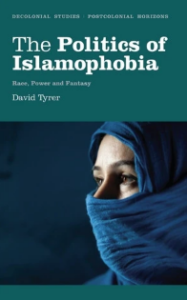 The Politics of Islamophobia: Race, Power and Fantasy – David Tyrer
The Politics of Islamophobia: Race, Power and Fantasy – David Tyrer
Despite its emblematic place within contemporary racism and its increasingly important position in defining relations between states and ethnicised minorities, Islamophobia remains a contested, frequently unrecognised and largely under-theorised form of racism.
The Politics of Islamophobia provides a definitive contribution to these debates, offering a theoretically sophisticated account which draws upon a series of substantive case studies to position Islamophobia as an expression of racialised governmentality.
By taking into account connections across different national contexts, and by moving beyond the limiting framing of the war on terror which has dominated recent debates, this book offers a new perspective on the study of Islamophobia.
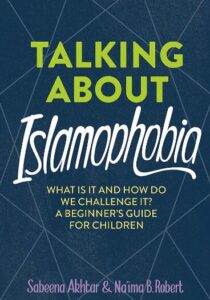 Talking About Islamophobia – Sabeena Akhtar, Na’ima B. Robert
Talking About Islamophobia – Sabeena Akhtar, Na’ima B. Robert
Islamophobia is a form of religious prejudice aimed at Muslims and it is on the rise. But not everyone agrees that Islamophobia exists – and some people think that we should be afraid of Muslims and Islam. This book, aimed at young readers aged 10 and upwards, aims to encourage a conversation about Islamophobia – what it is, where it comes from and what can be done to stand against it.
It shares the perspectives of those who have faced discrimination due to their faith, and takes a frank look at the frontlines of hate crime where Islamophobia is found – in the media, in politics and in daily interactions.
The authors talk about their experiences of religious discrimination and anti-Muslim hate crimes, look at how international politics can affect ordinary people, and discuss what can be done to make our society a safe space for us all.
The idea that the expression of radical beliefs is a predictor to future acts of political violence has been a central tenet of counter-extremism over the last two decades. Not only has this imposed a duty upon doctors, lecturers and teachers to inform on the radical beliefs of their patients and students but, as this book argues, it is also a fundamentally flawed concept.
Informed by his own experience with the UK’s Prevent programme while teaching in a Muslim community, Rob Faure Walker explores the linguistic emergence of ‘extremism’ in political discourse and the potentially damaging generative effect of this language.
Taking a new approach which combines critical discourse analysis with critical realism, this book shows how the fear of being labelled as an ‘extremist’ has resulted in counter-terrorism strategies which actually undermine moderating mechanisms in a democracy. Analysing the generative mechanisms by which the language of counter-extremism might actually promote violence, Faure Walker explains how understanding the potentially oppressive properties of language can help us transcend them. The result is an imminent critique of the most pernicious aspects of the global War on Terror, those that are embedded in our everyday language and political discourse.
Drawing on the author’s own successful lobbying activities against counter-extremism, this book presents a model for how discourse analysis and critical realism can and should engage with the political and how this will affect meaningful change.
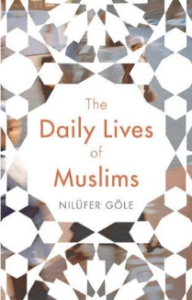 The Daily Lives of Muslims: Islam and Public Confrontation in Contemporary Europe – Nilufer Gole
The Daily Lives of Muslims: Islam and Public Confrontation in Contemporary Europe – Nilufer Gole
Description For many in the West, Islam has become a byword for terrorism. From 9/11 to the Paris attacks, our headlines are dominated by images of violence and extremism. Now, as the Western world struggles to cope with the refugee crisis, there is a growing obsession with the issue of Muslim integration.
Those Muslims who fail to assimilate are branded the ‘enemy within’, with their communities said to provide a fertile breeding ground for jihadists. Such narratives, though, fail to take into account the actual lives of most Muslims living in the West, fixating instead on a minority of violent extremists.
In The Daily Lives of Muslims, Nilüfer Göle provides an urgently needed corrective to this distorted image of Islam. Engaging with Muslim communities in twenty-one cities across Europe where controversies over integration have arisen – from the banning of the veil in France to debates surrounding sharia law in the UK – the book brings the voices of this neglected majority into the debate. In doing so, Göle uncovers a sincere desire among many Muslims to participate in the public sphere, a desire which is too often stifled by Western insecurity and attempts to suppress the outward signs of religious difference.
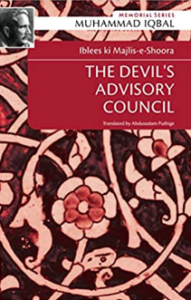 The Devil’s Advisory Council – Muhammad Iqbal
The Devil’s Advisory Council – Muhammad Iqbal
Iblees ki Majlis-e-Shoora is a conversation between Iblees (the devil) and the five members of his advisory council. It is one of the final works of Allama Iqbal.
The work consists of 64 amazingly dramatized, well composed couplets. Here, Iblees presides over the clandestine session and leads the conversation.
He boasts how successfully he has mislead Mankind throughout history by introducing ideas and doctrines such as Imperialism, Capitalism, Fascism etc., which have ultimately landed the human society in ruins. His advisers point towards a few emerging trends such as Western democracy and Marxism that they saw as potential threats to the evil regime of Iblees.
Summarily dismissing all these apprehensions of his advisers, Iblees concludes, that the revolutionary spirit of Islam is the greatest threat to his evil empire and hence the most crucial task ahead was to stop the waves of Muslim resurgence. He instructs them to keep the followers of Islam totally preoccupied with vain spiritual rituals, complex philosophical debates and narrow theological intricacies.
Allama Iqbal, an advocate of universal human fraternity, envisaged the revival of the original Islamic civilization, globally. His works, exposed the limitations of the socio-political and economic concepts introduced by the West.
 Britain and Islam: The History from 622 to the Present Day – Martin Pugh
Britain and Islam: The History from 622 to the Present Day – Martin Pugh
In this broad yet sympathetic survey-ranging from the Crusades to the modern day-Martin Pugh explores the social, political, and cultural encounters between Britain and Islam. He looks, for instance, at how reactions against the Crusades led to Anglo-Muslim collaboration under the Tudors, at how Britain posed as defender of Islam in the Victorian period, and at her role in rearranging the Muslim world after 1918.
Pugh argues that, contrary to current assumptions, Islamic groups have often embraced Western ideas, including modernization and liberal democracy. He shows how the difficulties and Islamophobia that Muslims have experienced in Britain since the 1970s are largely caused by an acute crisis in British national identity. In truth, Muslims have become increasingly key participants in mainstream British society-in culture, sport, politics, and the economy.

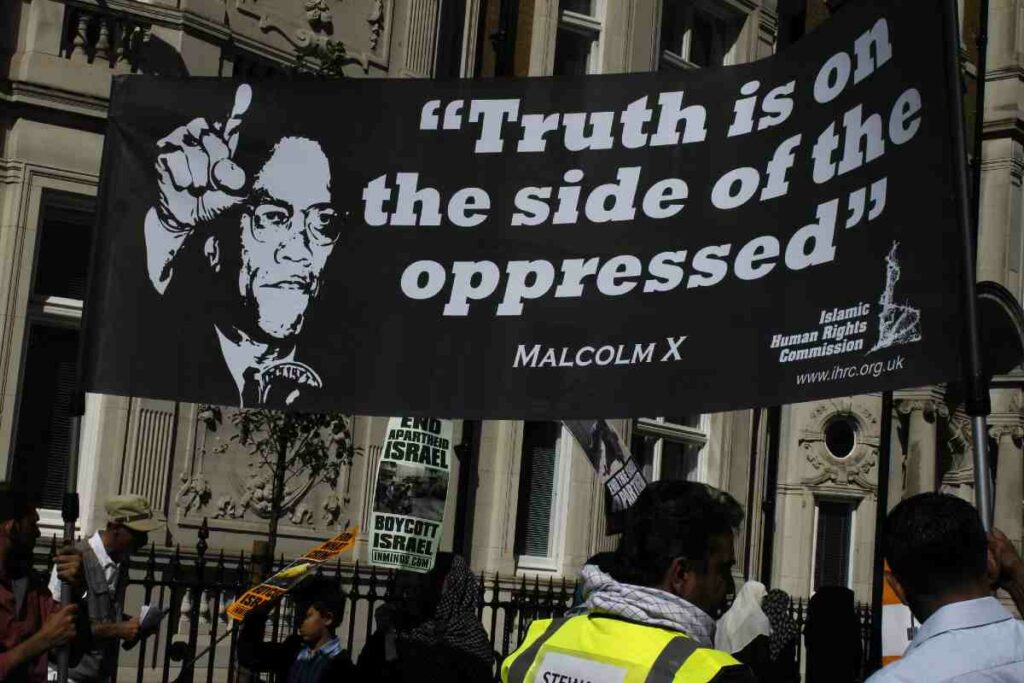
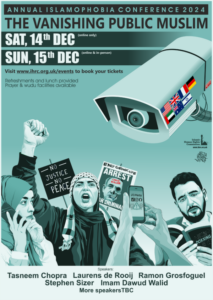 Islamophobia Conference 2024
Islamophobia Conference 2024 Support IHRC
Support IHRC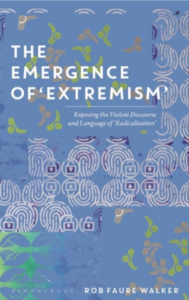 The Emergence of ‘Extremism’: Exposing the Violent Discourse and Language of ‘Radicalisation’ – Rob Faure Walker
The Emergence of ‘Extremism’: Exposing the Violent Discourse and Language of ‘Radicalisation’ – Rob Faure Walker




